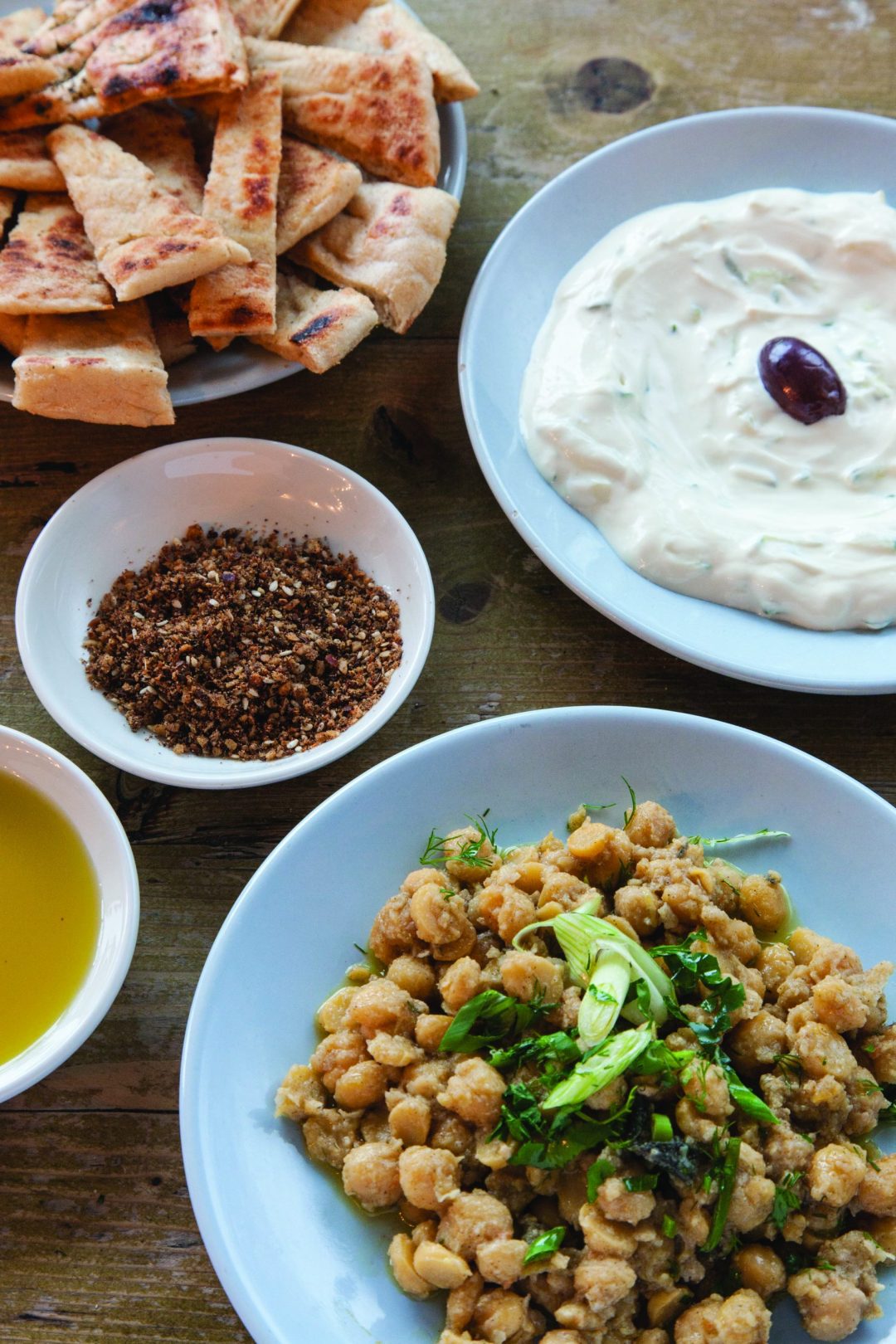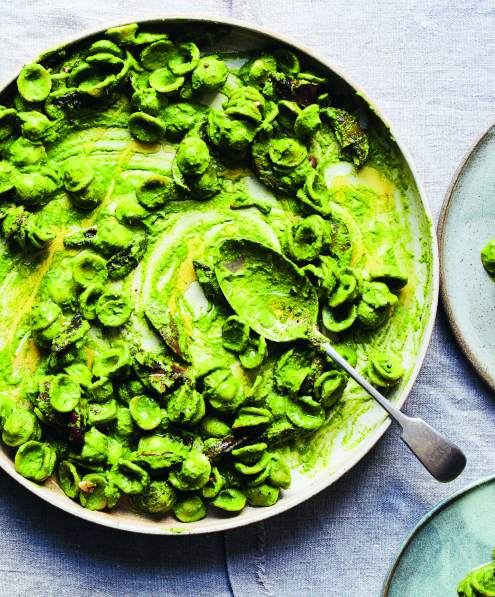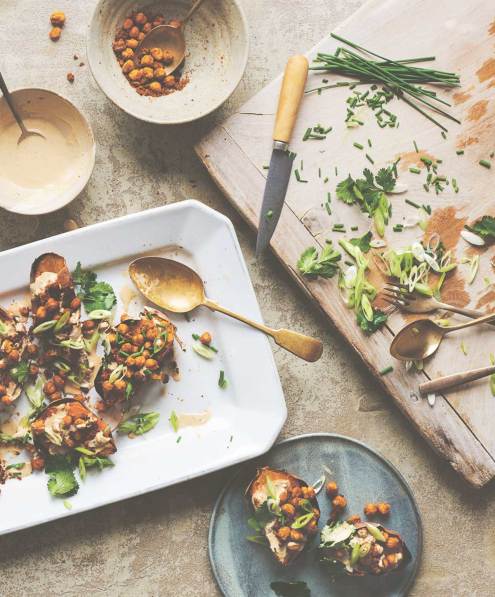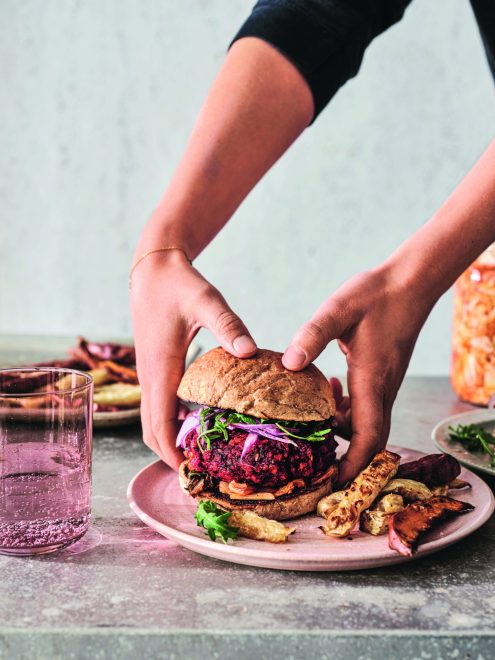Tonia Buxton: The Real Greek Cook Book
Tonia Buxton shares the inspiration behind her cook book 'The Real Greek Cook Book' with Psychologies magazine, along with 2 delicious recipes for greek dips, 'Revithia' and 'Tzatziki'.

Life today is so hectic and we all seem to be time poor, but one thing we really need to do is look after our own health and well being. I take inspiration from the great Greek philosophers of over 2000 years ago, as their knowledge is just as relevant now as it was then.
G. M. Travelyan said ‘I have two doctors, my left let and my right’. We are all way too sedentary – it’s not actually our faults that jobs have evolved that way – but we need to get out more. If we walk, move and breathe more every day, we will prevent no end of illness. I have to get up and do what I’m going to do in the mornings, often before I drop my children to school, because I know that I will not be able to summon the will at the end of the day.
Alexander the Great said ‘I am dying from the treatment of too many physicians’. I worry that we rely too much on pills and potions to cure our ills, when really we should be preventing them to start with. Exercise and good nutrition are the best medicine we have to make ourselves well, and yet we do the opposite.
Aristotle said ‘If one way be better than another, that you may be sure is nature’s way’. We really do need to go back to nature, and eat clean and good foods. The best diet for that is the Greek diet. The Orthodox religious calendar decrees that you must follow a vegan diet for a lot of the year (40 days before Easter, two weeks at Christmas and the Assumption in August, plus countless other days dotted in between). It is amazing!
So, a simple way of making ourselves better is to try to feed ourselves good food. I am no saint – I love wine, chocolate and cocktails but, as the great man Aristotle said, ‘Ola Ban Metron’, or ‘Everything in moderation’. We all now know that the best diet for longevity is the Mediterranean diet, but the best diet within the Med is the Greek diet. In Crete, in the 1970s and 80s, when the Cretans were eating their own indigenous diet, there was almost no heart disease on the island. Ikaria, a small island in the Aegean Sea, is said to have the secret to long life. Not only do the people live longer there, but they are happier too. This is because of their mind-set (we should slow down and smile), their lifestyle (which is very active, as Ikaria is quite a mountainous terrain), and their diet, made up of Greek food.
The joy of Greek food is that it is very easy to make, as it is simple and rustic. You just need to follow a few principles:
- Keep the ingredients natural: if you are looking at a chicken breast, the only thing in the ingredients list should be chicken breast. If there are a whole load of other things on the list, like dextrose, E numbers and preservatives, then seriously, that’s not the one to get.
- Buy the best that you can afford. If you can go to your local farmer and get fresh eggs: brilliant. But, if not, then buy organic, and if you can’t then get free range and so forth. Good ingredients are the foundations of good eating.
- Cook from scratch. I know this sounds hard, but it really isn’t! Start simple; a basic pan fry with lots of vegetables and spices. Or try an easy to make tomato sauce, which can be the foundation for many meals: as a simple pasta sauce, or the start of a chicken bake, or the base of a lovely vegetable mousakka. I try to make it in big batches and freeze it, as when I’m stuck for something to cook, I know I have something to start with.
- Think about flavours you like to eat, and find a basic recipe with those flavours in and give it a go. I think one of the biggest problems is people are fearful to try new things, but it is a joy once you get the hang of it.
- Do not fall for anything that has the tag ‘healthy’ on it, especially if it also has ‘sugar-free’ or ‘fat-free’. (It will be full of synthetic sugars and nasty chemicals).
- I was so shocked when I realised how much sugar was in my child’s yogurts, which also had in bold writing ‘Full of calcium’ and ‘Healthy’ written on it. Rubbish! If you want a flavoured yogurt, go and buy a good Greek yogurt, which has more protein and less fat than normal yogurts. (It takes four litres of milk to make one litre of Greek yogurt, and this is because it is thickened through churning and not through adding fillers). Add to that lovely yogurt some fruit, honey or jam. These are relatively natural sugars, rather than synthetic ones, and let you know that you are getting just the one teaspoon of sugar and not the six the food producers are adding.
So, now you know these basic rules, there is nothing stopping you cooking up some delicious Greek food! It will feed your tummies and your soul, give you energy and make you happy – just ask the Ikarians.

Tzatziki
Serves 4
4 large cloves of garlic, grated or minced
1 tbsp. olive oil, plus extra for dressing
1 large firm cucumber
1 tbsp. lemon juice or white wine vinegar
500g strained natural yoghurt
A handful of dried Greek mint or 3 tbsp. freshly chopped mint or dill
Salt, to taste
Fresh mint sprigs and an olive, to garnish
Cool and refreshingly tangy, this creamy yoghurt and cucumber dip is well known around the world. We all have our own variation and preference, sometimes stronger on sweet mint other times heavy on garlic. Always served chilled, it is great with molten halloumi, kebabs, grilled meats and fish, as a dip, and used as a spread or dressing.
- Crush the garlic into the oil with a pinch of salt and leave to infuse.
- Coarsely grate the cucumber into a colander in the sink. Salt lightly, toss and leave to drain for 30 minutes.
- Stir the garlicky oil and lemon juice or vinegar into the yoghurt. Squeeze out the cucumber very well, then stir this in, too. Allow to sit for a couple of hours.
- Just before serving, season to taste, adding more oil or vinegar if necessary, then rub the dried mint between your fingers to crumble into the yoghurt. Alternatively, add some finely chopped dill or mint (discarding the tough stems) and stir into the tzatziki. Garnish with an olive.
Kitchen note: Dried Greek mint is used a lot in place of fresh mint for crumbling into dishes as it has a stronger, sweet taste.
Revithia
Serves 4–6 as Meze
500g dried chickpeas
1 onion, finely chopped
1 carrot, finely chopped
1 small leek, finely sliced
1 stick celery, finely chopped
3-4 cloves of garlic, finely chopped or minced
Juice of 3 large lemons @ 100ml
Zest of 1 lemon
200ml olive oil
2 tbsp. finely shredded sage leaves
Sea salt and freshly ground black pepper
Revithia was traditionally made using chickpeas baked with onions in olive oil and flavoured with bay leaf and rosemary. The pot would be taken to the local bakery to be cooked overnight in their oven. The Real Greek recipe stirs in sage and plenty of fresh lemon…and is just as delicious!
- Soak the chickpeas in plenty of water overnight.
- Drain,put in a saucepan with 1 litre of cold water and the onion, carrot, leek, celery and garlic, bring to the boil, skimming away any sediment. Reduce the heat to a simmer, cover and cook until the chickpeas are tender, adding a little extra water if required.
- In a large bowl, mix together the lemon juice, zest, olive oil, sage and a little black pepper.
- Drain the chickpeas thoroughly and stir into the dressing.
- Season with salt to taste and serve warm.
Kitchen note: If you want to short cut this recipe use 2 x 400g cans of chickpeas, rinsed and drained. Fry the finely chopped vegetables first in olive oil before adding the chickpeas. Then mix into the dressing.

The Real Greek Cook Book with Tonia Buxton out 14th July RRP £20 (Blink Publishing)








